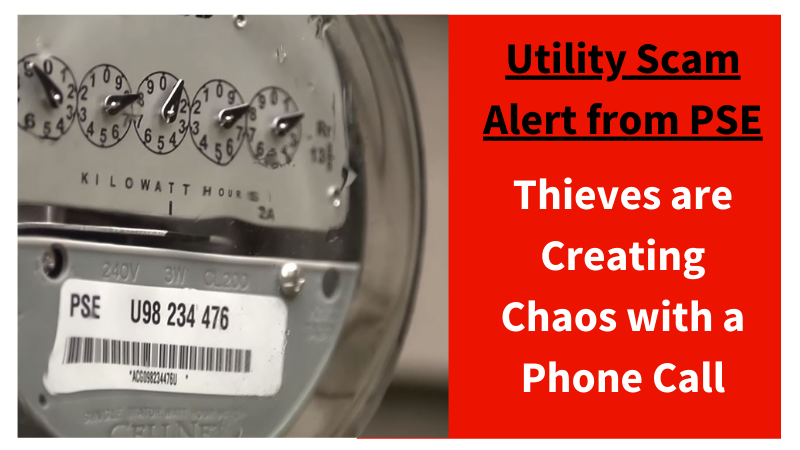AARP Washington is spreading the word about a new scam sweeping Washington state that has the potential to affect a wide variety of households: customers of Puget Sound Energy. Both PSE and AARP want you to know what to expect if you get the call, how to recognize the warning signs of fraud, and how to report scams so more people can avoid them in the future.
With this new phone call, a computerized voice tells the listener their service is going to be disconnected, and that it’s going to be disconnected today. After this attention-getting announcement, the voice explains you have fallen behind on paying your bill, but that you can either call a customer service number or ‘press 1’ to make a payment right away.

PSE wants all of its customers to know that it simply does not conduct business this way. PSE has produced a video that explains how, when a customer falls behind, it tries to get in touch for several weeks before taking any action, including sending at least two different letters through the U.S. Postal Service. The bottom line is that any call that comes from out of the blue, threatening immediate action, should raise a red flag.
It also points out one detail of this call that can tip you off to many of the similar scams happening these days: settling your debts by sending someone a pre-paid debit card. Demanding this type of debit card, or gift card, is very common in today’s scamming world, and should always be a seen as a sign that something is not right.
The scammers do have a piece of technology that is very effective at making them appear legitimate: spoofing. When it comes to phone calls, they’re able to make any number they want show up on your caller ID, leading you to believe that you are, indeed, talking to the people they’re pretending to be.
So, what do you do when you detect the warning signs of a telephone scam? PSE, AARP, and every other organization that protects people from fraud all give the same advice: If anything about the call seems suspicious, hang up. Whether the caller claims to be from a public utility, a police department, or a charity looking for donations, there’s always a way for you to get in touch with them and make sure the situation is legitimate.
Puget Sound Energy wants to know about every scam that uses its name, and would like to hear from you at its real customer service number, 1-888-225-5773. Feedback received from clients allows PSE to maintain a website with all sorts of information that can help you keep yourself safe.
AARP has also set up a Fraud Watch Network Hotline at 1-877-908-3360, as well as its Washington State Tip-Offs to Rip-Offs webpage. AARP also hosts a page that highlights the five most prevalent scams affecting Bellingham specifically, which allows you to listen to a recording of the actual call so you’ll know in advance if it happens to you. The localized alerts are part of an ongoing consumer protection partnership with AARP, the Bellingham Police Department, the Northwest Regional Council, the Whatcom County Asset Building Coalition, the State Attorney General’s Office, BECU, and Nomorobo.
Because utility scams have become so prevalent, AARP has published an article that does a good job explaining how a variety of scams work. These include people showing up at your door to offer energy-saving improvements, and asking for your bank account information because you accidentally paid too much.
Whether they are trying to offer you good news or threaten you with bad news, these scams don’t appear to be going away. Fortunately, we have partners in the community who offer educational resources and support we can all use to protect ourselves from being the next victims.
Sponsored











































